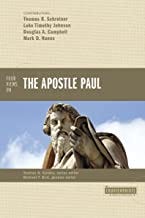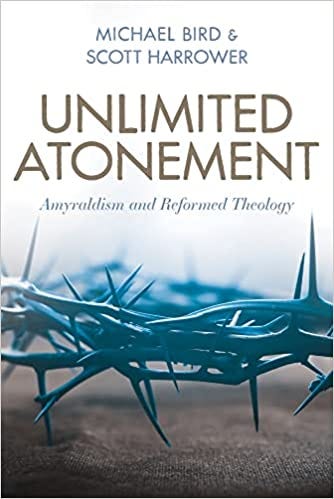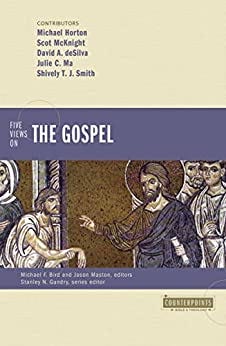My Edited Books



I have finished the series on “The Story of My Books” detailing the back-story behind all of my 25 or so books.
As a follow-up, I thought I’d give a list and brief description of the many books that I have edited, most of scholarly nature, but many are intended for students and the wider public.
Michael F. Bird and Preston M. Sprinkle (eds.), The Faith of Jesus Christ: Exegetical, Biblical and Theological Studies (Carlisle, UK: Paternoster/Peabody, MA: Hendrickson, 2009).
One of the most perplexing problems in Pauline studies is the meaning of the phrase pistis christou. Is Paul speaking of our faith in Christ or of Christ's own faithfulness toward God? Here noted contemporary New Testament scholars join forces--and lock horns--to shed light on the answer by presenting rigorous exegetical studies from both sides of the debate. They also bring fresh creative proposals to bear on the problem, and place the discussion in the wider spectrum of historical, biblical, and systematic theology. The most penetrating and comprehensive attempt to date to grapple with the significance of Jesus' faithfulness and obedience for Christian salvation, and the extent to which it is represented in key biblical texts.
Michael F. Bird and Michael Pahl (eds.), The Sacred Text: Excavating the Texts, Exploring the Interpretations, and Engaging the Theologies of the Christian Scriptures (Piscataway, NJ: Gorgias Press, 2010).
The Sacred Text presents an introduction to historical, interpretive, and theological issues relating to the Christian Scriptures. It presents an overview of the formation of the canon, discusses different strategies for interpretation, and describes how Scripture functions in different theological traditions.
Michael F. Bird and Joel Willitts (eds.), Paul and the Gospels: Christologies, Conflicts, and Convergences (LNTS 411; London: T&T Clark, 2011).
This volume, which collects together the work of several established scholars attempts to situate the Apostle Paul, the Pauline writings, and the earliest Christian Gospels together in the context of early Christianity. It addresses the issue of how the Christianity depicted in and represented by the individual Gospels relates to the vision of Christianity represented by Paul and the Pauline writings.
Michael F. Bird and Joseph R. Dodson (eds.), Paul and the Second Century: The Legacy of Paul’s Life, Letters, and Teaching (LNTS 412; London: T&T Clark, 2011).
This volume looks at the imprint and influence that the writings of the Apostle Paul had in the second century, examining the Pauline corpus in conjunction with key second century figures and texts such as Ignatius, Polycarp, and the Epistle of Diognetus . It investigates the impact of Paul's legacy and examines how this legacy shaped the Christianity that emerged in the second century as represented by the Apostolic Fathers, the early Christian Apologists, and among Gnostic and Judeo Christian groups.
Michael F. Bird and Jason Maston (eds.), Earliest Christian History: History, Literature, and Theology. Essays from the Tyndale Fellowship in Honour of Martin Hengel (WUNT; Tübingen: Mohr/Siebeck, 2012).
Martin Hengel (1926-2009) was a historian of the early church and ancient Judaism. His influence extended through his many publications, research students, conference participation, and ecclesiastical work. His scholarly legacy was honoured by a conference at Tyndale House in July 2010 with a number of speakers from Germany, England, and the USA coming together to remember and honour their colleague with papers on topics that Martin Hengel spent his life exploring. The essays in this volume include biographical works by former students remembering him as both a teacher and Christian scholar. Thereafter, several essays on Christology, the Gospels, and Judaism and Early Christianity engage with his contribution to these areas. Also included in the collection are new translations of six of Martin Hengel's most important essays put into English for the first time.
Michael F. Bird and Brian Rosner (eds.), Mending a Fractured Church: How to Seek Unity with Integrity (Bellingham, WA: Lexham, 2015).
When Jesus prayed for his followers to be one, he prayed that this unity would demonstrate the truth of his claims to an unbelieving world. Sadly, the world often sees a church that is divided. Some of our divisions are based on legitimate theological concerns, yet many others are simply matters of opinion. To the world, it's all another reason to doubt God. What are the differences worth dividing over? How should we handle diversity? Mending a Fractured Church, edited by Michael Bird and Brian Rosner, seeks to answer such questions, looking to the Bible for examples of how to behave when Christians differ. Speaking to pastors, churches, and seminary students, the contributors provide a guide to maintaining unity without compromise.
Michael F. Bird and Christoph Heilig and Jay T. Hewitt (eds.), God and the Faithfulness of Paul (WUNT 2.413; Tübingen: Mohr/Siebeck, 2016).
N. T. Wright's magnum opus Paul and the Faithfulness of God is a landmark study on the history and thought of the apostle Paul. This volume brings together a stellar group of international scholars to critically assess an array of issues in Wright's work. Essays in Part I set Wright in the context of other Pauline theologies. Part II addresses methodological issues in Wright's approach, including critical realism, historiography, intertextuality, and narrative. In Part III on context, scholars measure Wright' representation of early Judaism, Greek philosophy, paganism, and the Roman Empire. Part IV turns to Wright's exegetical decisions regarding law, covenant, and election, the "New Perspective," justification and redemption, Christology, Spirit, eschatology, and ethics. Part V at last speaks to the implications of Wright's work for the church's theology, sacraments, and mission, and for global responsibility in a "postmodern" age. The volume includes a critical response from Wright himself.
Michael F. Bird and Scott Harrower (eds.), Trinity without Hierarchy: Reclaiming Nicene Orthodoxy in Evangelical Theology (Grand Rapids, MI: Kregel, 2019).
In response to those complementarian theologians who assert that the Son is eternally subordinate to the Father, the contributors to Trinity Without Hierarchy contend that this view misconstrues the orthodox doctrine of the Trinity and reduces the Son to a lower level of glory and majesty than the Father. Surveying Scripture, church history, and theology, sixteen contributors present a defense of the full and equal authority of all three members of the Trinity while critiquing approaches that border on semi-Arianism. In particular, the creedal confessions of Nicaea are upheld as the historical standard by which any proposed Trinitarian doctrine should be judged. While some contributors hold complementarian and others egalitarian viewpoints, all agree that Trinitarian relations are not a proper basis for understanding gender roles. Trinity Without Hierarchy is indispensable reading for anyone interested in the current debate over the relationship between Trinitarian theology and the roles of men and women.
Michael F. Bird and Scott Harrower (eds.), The Cambridge Companion to the Apostolic Fathers (Cambridge: CUP, 2021).
The Cambridge Companion to the Apostolic Fathers offers an informative introduction to the extant body of Christian texts that existed beside and after the New Testament known to us as the apostolic fathers. Featuring cutting-edge research by leading scholars, it explores how the early Church expanded and evolved over the course of the first and second centuries as evidenced by its textual history. The volume includes thematic essays on imperial context, the relationship between Christianity and Judaism, the growth and diversification of the early church, influences and intertextuality, and female leaders in the early church. The Companion contains ground-breaking essays on the individual texts with specific attention given to debates of authorship, authenticity, dating, and theological texture. The Companion will serve as an essential resource for instructors and students of the first two centuries of Christianity.
Michael F. Bird and Scott Harrower (eds.), Unlimited Atonement: Amyraldianism and Reformed Theology (Grand Rapids, MI: Kregel, 2023).
"Hypothetical universalism," or "unlimited atonement," states that Christ's death is sufficient for the guilt of all people yet is only effectively applied to those with faith. This tradition, typified by the French Reformer Moïse Amyraut, has continued among Anglicans and Baptists for over four centuries, yet has been underexplored in Reformed systematic theology.
Unlimited Atonement fills a gap in resources on atonement theology that begin with the unlimited love of God. Editors Michael F. Bird and Scott Harrower draw on the specialties of each of the ten contributors, addressing themes such as - the biblical and historical sources of the soteriological position known as Amyraldism - distinctive features of Anglican atonement theology - hypothetical universalism, election, and the Baptist theological tradition - other prominent advocates of unlimited atonement - the issues of systematic theology at stake - atonement theology in preaching Unlimited Atonement is the most comprehensive analysis of Amyraldism to date, providing a resource for theology and Bible students and teachers in an esoteric stream of Reformed theology. Bird and Harrower provide a starting point for anyone who wants to understand the sources and merits of Amyraldism.
Michael F. Bird and Scot McKnight (eds.), God’s Israel and the Israel of God: Paul and Supersessionism (Bellingham, WA: Lexham, 2024).
Paul believed Israel's Messiah had come. But what does this mean for Israel? Debate rages over Paul and supersessionism: the question of whether―and if so, to what extent―the new covenant in Christ replaces God's "old" covenant with Israel. Discussion of supersessionism carries much historical, theological, and political baggage, complicating attempts at dialogue. God's Israel and the Israel of God: Paul and Supersessionism pursues fruitful discussion by listening to a variety of perspectives. Scot McKnight, Michael F. Bird, and Ben Witherington III consider supersessionism from political, biblical, and historical angles, each concluding that if Paul believed Jesus was Israel's Messiah, then some type of supersessionism is unavoidable even if it is not necessarily a replacement of Israel by the church. Lynn H. Cohick, David J. Rudolph, Janelle Peters, and Ronald Charles respond to the opening essays and offer their own perspectives. Readers of God's Israel and the Israel of God will gain a broader understanding of the debate, its key texts, and the factors that shaped Paul's view of Israel.

